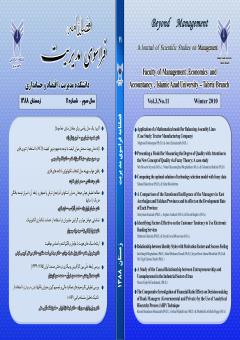یافتن جواب بهینه مدل انتخاب تکنولوژی با داده های فازی
محورهای موضوعی : مدیریت بازرگانیسهند دانشور 1 , سحر خوش فطرت 2
1 - استادیار گروه مدیریت، واحد تبریز،دانشگاه آزاد اسلامی،تبریز،ایران
2 - کارشناسی ارشد ریاضی کاربردی، گرایش تحقیق درعملیات، باشگاه پژوهشگران جوان واحد تبریز، دانشگاه آزاد اسلامی واحد تبریز
کلید واژه: تحلیل پوششی داده ها, تکنولوژی تولید پیشرفته, انتخاب تکنولوژی, پیچیدگی محاسباتی, تحلیل پوششی داده های فازی,
چکیده مقاله :
در این مقاله روشی برای یافتن جواب بهینه مدل انتخاب تکنولوژی با داده های فازی معرفی می شود. مقاله یک روش ساده محاسباتی برای یافتن جواب بهینه مساله برنامه ریزی خطی فازی مدل انتخاب تکنولوژی پیشنهاد می کند که درآن نیاز به حل هیچ LP فازی نیست. این تحقیق از پیچیدگی محاسبات داده های فازی می کاهد و زمانیکه پیچیدگی بیشتری مطرح می شود اهمیت این روش نیز افزایش می یابد.
This paper introduces a method to find the optimal solution of technology selection model with fuzzy data. The paper suggests a simple computational method to obtain the optimal solution of fuzzy linear programming (LP) problem used in technology selection without the need for solving any fuzzy LP. Clearly the contribution of this research is that it reduces the fuzzy computational complexity, which is significant when dealing with more complex computations.
Amin GR, Toloo M, Sohrab B, (2006), An Improved MCDM DEA model for technology selection, International of production Research 44(13), 2681-2686.
Amin GR, (2009), Optimal solution of technology selection model: A computational efficient form.
Braglia M, Petroni A, (1999), A robust multivariate statistical procedure for evaluation and selection of industrial robots. International Journal of production Research, 37, 4157-4178.
Charnes A, Cooper W.W, Rhodes E, (1978), Measuring the efficiency of Decision Making Units, European Journal of Operational Research 2(6), 429-444.
Cook WD, Kress M, Seiford LM, (1996), Data envelopment analysis in the presence of both quantitative and qualitative factors. Journal of the Operational Research Society, 47, 945-953.
Cooper W.W, Seiford L.M, Tone K, (2006), Introduction to Data envelopment analysis and its uses with DEA – solver software and references. Springer, USA,221-431.
Farzipoor SR, (2008), Technology selection in the presence of imprecise data, weight restrictions, and nondiscretionary factors.
Guo, P., & Tanaka, H.,(1998), Extended fuzzy DEA, in: Proceedings of the 3rd Asian Fuzzy Systems Symposium, 517–521.
Guo, P., & Tanaka, H., (2001), Fuzzy DEA: a perceptual evaluation method, Fuzzy Sets and Systems, 119, 149-160.
Kao, C., & Liu, S. T. (2000), Fuzzy Efficiency Measures in Data envelopment Analysis, Fuzzy Sets and Systems, 113, 427-437.
Karsak EE, Ahiska S.S, (2005), Practical common weight multi- criteria decision making approach with an improved discriminating power for technology selection. International Journal of production Research 43(8), 1537-1554.
Sun S, (2002), Assessing computer numerical control machines using data envelopment analysis. International Journal of production Research, 40, 2011-2039.
Talluri S, Yoon KP, (2000), A coneratio DEA approach for AMT justification. International Journal of Production Economics 66, 119-129.
Zimmermann, H. J.(1996), Fuzzy set Theory and Its Application, Kluwer Academic Publishers, London.
_||_
Amin GR, Toloo M, Sohrab B, (2006), An Improved MCDM DEA model for technology selection, International of production Research 44(13), 2681-2686.
Amin GR, (2009), Optimal solution of technology selection model: A computational efficient form.
Braglia M, Petroni A, (1999), A robust multivariate statistical procedure for evaluation and selection of industrial robots. International Journal of production Research, 37, 4157-4178.
Charnes A, Cooper W.W, Rhodes E, (1978), Measuring the efficiency of Decision Making Units, European Journal of Operational Research 2(6), 429-444.
Cook WD, Kress M, Seiford LM, (1996), Data envelopment analysis in the presence of both quantitative and qualitative factors. Journal of the Operational Research Society, 47, 945-953.
Cooper W.W, Seiford L.M, Tone K, (2006), Introduction to Data envelopment analysis and its uses with DEA – solver software and references. Springer, USA,221-431.
Farzipoor SR, (2008), Technology selection in the presence of imprecise data, weight restrictions, and nondiscretionary factors.
Guo, P., & Tanaka, H.,(1998), Extended fuzzy DEA, in: Proceedings of the 3rd Asian Fuzzy Systems Symposium, 517–521.
Guo, P., & Tanaka, H., (2001), Fuzzy DEA: a perceptual evaluation method, Fuzzy Sets and Systems, 119, 149-160.
Kao, C., & Liu, S. T. (2000), Fuzzy Efficiency Measures in Data envelopment Analysis, Fuzzy Sets and Systems, 113, 427-437.
Karsak EE, Ahiska S.S, (2005), Practical common weight multi- criteria decision making approach with an improved discriminating power for technology selection. International Journal of production Research 43(8), 1537-1554.
Sun S, (2002), Assessing computer numerical control machines using data envelopment analysis. International Journal of production Research, 40, 2011-2039.
Talluri S, Yoon KP, (2000), A coneratio DEA approach for AMT justification. International Journal of Production Economics 66, 119-129.
Zimmermann, H. J.(1996), Fuzzy set Theory and Its Application, Kluwer Academic Publishers, London.


